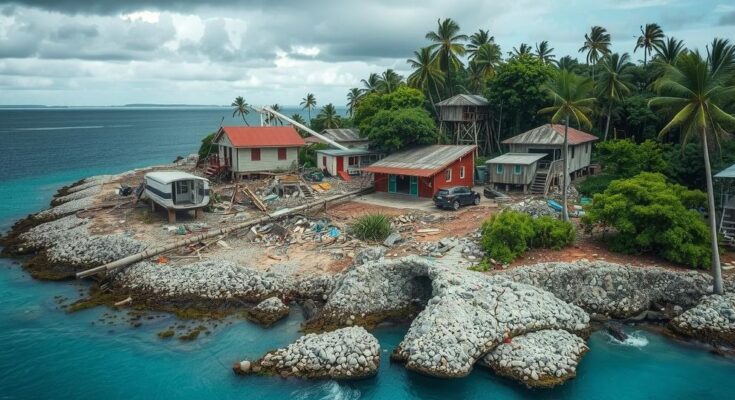Tropical Cyclone Chido has devastated Mayotte, leading to fears of hundreds of deaths as rescue operations struggle against damaged infrastructure. The cyclone’s heightened intensity was exacerbated by warm ocean waters, greatly affecting impoverished areas of the island. Government officials estimate casualties could be in the hundreds or potentially near a thousand, calling for urgent aid amid the ongoing crisis.
Hundreds of lives are feared lost following the devastation caused by Tropical Cyclone Chido in Mayotte, a French territory situated off the southeast coast of Africa. The cyclone made landfall with winds exceeding 155 mph, approximately equivalent to a Category 4 hurricane and marked as the most severe storm recorded to strike this island. Initial reports indicated a death toll of 20, but government officials are bracing for significantly higher numbers, predicting casualties could approach one thousand as recovery efforts continue. Mayotte Prefect François-Xavier Bieuville stated, “I think there are several hundred deaths. Perhaps we will approach a thousand.”
Chido generated unprecedented destruction, asserting its strength over unusually warm ocean waters while striking densely populated areas, where a substantial portion of the community lives below the poverty line. French Prime Minister François Bayrou acknowledged the exceptional severity of the storm, emphasizing the uncertainty surrounding exact casualty figures. The impact on critical infrastructure was devastating; the cyclone compromised the island’s hospital and airport, complicating rescue and aid operations.
The situation in Mayotte has been described as “dramatic” by French Interior Minister Bruno Retailleau, who also noted that many impoverished residents, particularly in slums, bore the brunt of the cyclone’s fury. Infrastructure in these areas has been decimated, with Estelle Youssouffa, a National Assembly member from Mayotte, reporting shantytowns have been completely destroyed, leaving communities without essential amenities such as electricity, food, and water.
The cyclone is part of a larger trend observed in the Southwest Indian Ocean, where tropical cyclone intensity has been on the rise, exacerbated by warmer ocean temperatures, a phenomenon linked to climate change. Research indicates that storms like Chido intensify rapidly when the ocean temperatures are significantly higher than normal, leading to the catastrophic outcomes witnessed in Mayotte.
Tropical Cyclone Chido has devastated Mayotte, a French overseas territory in the Indian Ocean, renowned for its vulnerable population and precarious living conditions. The environmental background highlights the region’s susceptibility to tropical cyclones, particularly with rising sea temperatures attributed to climate change. Historically, cyclones that approach from Madagascar typically weaken; however, Chido’s trajectory and intensification defied this trend, leading to unprecedented destruction. With a considerable undocumented immigration population in Mayotte, the social context complicates recovery efforts and data collection on casualties, as many victims may be buried without official medical acknowledgment due to religious customs.
In sum, Tropical Cyclone Chido has inflicted catastrophic damage on Mayotte, with fears of hundreds or potentially over a thousand casualties. The combination of intense winds and the cyclone’s path across densely populated areas has exacerbated existing vulnerabilities, revealing the critical need for immediate humanitarian assistance and longer-term infrastructural support. The incident serves as a stark reminder of the increasing severity of weather events linked to climate change and underscores the challenges faced by impoverished communities during natural disasters.
Original Source: www.spokesman.com




